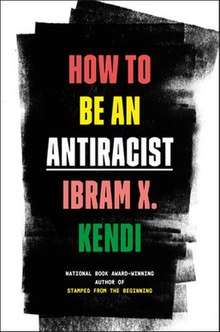How to Be an Antiracist
How to Be an Antiracist is a 2019 non-fiction book by American author and historian Ibram X. Kendi. The book discusses concepts of racism and Kendi's proposals for anti-racist individual actions and systemic changes. It received positive critical reception.
 Front cover | |
| Author | Ibram X. Kendi |
|---|---|
| Subject | Civil rights |
| Publisher | Random House |
Publication date | August 13, 2019 |
| Pages | 320 |
| ISBN | 9780525509288 |
Background
At the time of authorship, Ibram X. Kendi was an assistant professor of African-American History at the University of Florida.[1] He previously worked at the American University, where he founded the Antiracist Research and Policy Center.[2] He wrote a 2016 book titled Stamped from the Beginning, about the origins of racism in America.[3]
Synopsis
He relates his evolving concept of racism through the events of his own life, touching on observations from classes he has taught, contemporary events such as the O. J. Simpson robbery case and 2000 United States presidential election, and through historical events such as the scientific proposals of polygenism in Europe in the 1600s and racial segregation in the United States. Kendi further details the manifestations of racism, such as scientific racism, colorism and their intersection with demographics including gender, class and sexuality.
Kendi comes to define racism as any policy that creates inequitable outcomes between people of different skin colors. Therefore a person is not "a racist" (noun). A policy is "racist" (adjective). And policy is made by the powerful. He examines his own internalized racism and disagrees with the prejudice plus power model of racism, which would not allow for Black racism.
Finally, he suggests models for anti-racist individual actions and systemic changes.[4][2][5]
Reception
The book was published in August 2019 to mixed, but generally positive reviews. In June 2020, following protests in the wake of the killing of George Floyd, sales of How to Be an Antiracist surged.[6][7] The book was listed eighth and fifth in Publishers Weekly's hardcover non-fiction list on May 30 and June 6, respectively.[8] It was listed third in USA Today's Best-Selling Books List of June 10.[6] The book topped The New York Times Bestseller List in Hardcover Nonfiction list for sales in the week ending June 6.[7] It has spent a total of 18 weeks on the list, as of the July 19 edition of the list.[9]
Critical reception
Ayesha Pande praised the book in a starred review for Publishers Weekly, describing the prose as "thoughtful, sincere and polished" and the ideas as "boldly articulated" and "historically informed". Pande summarized, "This powerful book will spark many conversations".[4] A starred review for Kirkus Reviews found it to be "not an easy read but an essential one".[10] Jeffrey C. Stewart of The New York Times lauded it as the "most courageous book to date on the problem of race in the Western mind".[2] Ericka Taylor of NPR praised the book as "clear and compelling", saying that it is "accessible" and "exemplifies a commitment to clarity".[5]
In a mostly positive review by The Guardian's Afua Hirsch, the author received praise for "honesty in linking his personal struggles" to the book's subject, which Hirsch described as "brilliantly simple" and "dogmatic", but criticism for personal anecdotes that seem incomplete and for a style resembling a textbook too much.[11] It was the Book of the Day in a review for The Observer in which Colin Grant found that the book "encourages self-reflection" and praised the writing style as "calm" but "insightful".[12]
Coleman Hughes critiqued the book as "poorly argued, sloppily researched, insufficiently fact-checked, and occasionally self-contradictory".[13] In The Washington Post, Randall Kennedy, praised Kendi's book for its candor, independence, and self-criticalness, but also critiqued it as having major flaws—especially being internally contradictory and poorly reasoned.[14] Andrew Sullivan criticized the book as having the character of religious tract with overly simplistic distinctions between good and evil that cannot be falsified, and being sparse on practical suggestions.[15]
References
- "Ibram X. Kendi". University of Florida. Retrieved June 12, 2020.
- Stewart, Jeffrey C. (August 20, 2019). "Fighting Racism Even, and Especially, Where We Don't Realize It Exists". The New York Times. Retrieved June 12, 2020.
- "Ibram X. Kendi". National Book Foundation. Retrieved June 12, 2020.
- Pande, Ayesha. "How to Be an Antiracist". Publishers Weekly. Retrieved June 12, 2020.
- Taylor, Ericka (August 15, 2019). "Ibram X. Kendi Says No One Is 'Not Racist.' So What Should We Do?". NPR. Retrieved June 12, 2020.
- VanDenburgh, Barbara (June 10, 2020). "Anti-racist book dethrones 'Hunger Games' prequel on best-seller list amid mass protests". USA Today. Retrieved June 12, 2020.
- Egan, Elisabeth (June 11, 2020). "These Authors Are Glad You're Buying Their Books. Now Do the Work". The New York Times. Retrieved June 12, 2020.
- "This Week's Bestsellers from Publishers Weekly". The Spokesman-Review. June 11, 2020. Retrieved June 12, 2020.
- "Hardcover Nonfiction Books". The New York Times. July 19, 2020. Retrieved July 11, 2020.
- "How to Be an Antiracist". Kirkus Reviews. April 28, 2019. Retrieved June 12, 2020.
- Hirsch, Afua (October 11, 2019). "How to Be an Antiracist by Ibram X Kendi review – a brilliantly simple argument". The Guardian. Retrieved June 12, 2020.
- Grant, Colin (August 27, 2019). "How to Be an Antiracist by Ibram X Kendi – review". The Observer. Retrieved June 12, 2020.
- Hughes, Coleman (October 25, 2019). "How to Be an Anti-Intellectual". City Journal. Retrieved July 5, 2020.
- Randall Kennedy. "Review | A black academic grapples with his own racism". Washington Post. Retrieved July 5, 2020.
- Sullivan, Andrew (2019-11-15). "Andrew Sullivan: A Glimpse at the Intersectional Left's Political Endgame". Intelligencer. Retrieved 2020-07-06.